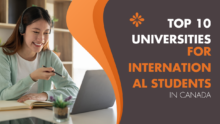10 Best Practices for Maximizing Your Education Experience in Australia
Introduction:
Australia, known for its vibrant cities, diverse culture, and top-notch education system, attracts students from around the globe. Studying in Australia is not just about obtaining a degree; it’s an immersive experience that combines academic excellence with a unique lifestyle. To make the most of your educational journey in the Land Down Under, here are 10 best practices to adopt for a fulfilling and successful time in Australia.
1. Embrace Cultural Diversity:
Australia is a melting pot of cultures, and universities reflect this diversity. Engage with students from various backgrounds, participate in cultural events, and broaden your perspectives. Embracing diversity enhances your educational experience both inside and outside the classroom.
2. Connect with Local Communities:
Australian cities offer a rich tapestry of local communities. Take the time to explore and engage with them. Attend local events, volunteer, or join community organizations. Connecting with the local community provides a more immersive experience and enriches your understanding of Australian life.
3. Explore the Great Outdoors:
Australia boasts stunning landscapes, from pristine beaches to lush rainforests. Take advantage of your time there by exploring the great outdoors. Join hiking groups, surf at renowned beaches, or simply enjoy a picnic in one of the many parks. Balancing studies with outdoor activities promotes overall well-being.
4. Utilize University Support Services:
Australian universities offer extensive support services to international students. From academic assistance to mental health resources, familiarize yourself with the support available on campus. Utilizing these services ensures you have the tools needed to thrive academically and personally.
5. Embrace the ‘Work and Study’ Culture:
Australia encourages students to gain practical experience alongside their studies. Consider part-time work, internships, or cooperative programs related to your field of study. This not only provides financial support but also enhances your employability post-graduation.
6. Develop Strong Time Management Skills:
Balancing coursework, part-time work, and personal activities requires effective time management. Develop a schedule that allows for dedicated study time, work commitments, and leisure. Prioritize tasks and set realistic goals to maintain a healthy work-life balance.
7. Engage in Student Societies and Clubs:
Australian universities host a myriad of student societies and clubs. Joining these groups offers opportunities for networking, skill development, and socializing. Whether it’s a sports club, cultural society, or academic group, involvement enhances your overall university experience.
8. Attend Career Development Workshops:
Australian universities provide comprehensive career development services. Attend workshops on resume building, job interviews, and networking. Engaging in these programs early on can give you a competitive edge in the job market upon graduation.
9. Embrace the ‘Fair Dinkum’ Attitude:
Australians are known for their laid-back and friendly attitude. Embrace the ‘fair dinkum’ culture by being genuine, approachable, and open to new experiences. Developing authentic connections with locals contributes to a positive and enriching stay.
10. Prioritize Health and Well-being:
Maintaining good physical and mental health is integral to academic success. Australia offers excellent healthcare services, so prioritize regular check-ups. Additionally, engage in physical activities, practice mindfulness, and seek support if needed to ensure a holistic well-being.
Conclusion:
Studying in Australia is not just about earning a degree; it’s about immersing yourself in a diverse and dynamic culture. By embracing these 10 best practices, you can maximize your education experience, foster personal growth, and create lasting memories in the beautiful and welcoming country of Australia.









